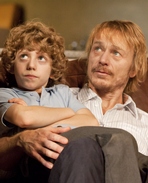SITE GUIDE
SEARCH
REVIEWS
REVIEW ARCHIVES
ADVERTISING AT CURTAINUP
FEATURES
NEWS
Etcetera and
Short Term Listings
LISTINGS
Broadway
Off-Broadway
NYC Restaurants
BOOKS and CDs
OTHER PLACES
Berkshires
London
California
New Jersey
DC
Connecticut
Philadelphia
Elsewhere
QUOTES
TKTS
PLAYWRIGHTS' ALBUMS
LETTERS TO EDITOR
FILM
LINKS
MISCELLANEOUS
Free Updates
Masthead
Writing for Us
A CurtainUp  London Review
London Review
 London Review
London ReviewHaunted Child
|
But - if we are going to die anyway - what’s the point?
— Child
|

Jack Boulter as Thomas and Ben Daniels as Douglas (Photo: Johan Persson) |
Douglas makes a terrifying entrance. He is thin, haggard, unkempt, his suit is crumpled, his hair all over the place and worse, half his top teeth are missing. He has been hiding in the loft for a day, having let himself in with his house keys. His wife is brimful of questions and incomprehension.
Where has he been? Why did he just leave like that? She called the police. No one knew where he was or what had happened to him. Not his employer, not his brother or mother or friends. The police thought it most likely that he had run off with another woman.
Slowly it emerges that Douglas has found a new spirituality. He is now part of what he calls “my group”, a community of like minded people aiming for enlightenment, practising denial, abstinence and chastity and he has come home to realise half the value of their home.
There is no actress who can translate the puzzlement and pain that Sophie Okonedo conveys. The rush of questions, the frustration at his answers, if not actually evasive, they are enigmatic and without comprehension. Further she does not have her loving husband and Thomas’s father back but someone she does not recognise, who only eats a banana and a boiled egg daily and drinks a bucket of salt water to make him vomit, a purgative ritualistic act of cleansing which he shows us onstage. He tries to explain this new found “religion”, a “further than Buddhist” life of increased spirituality, but Julie and we, the audience, are not convinced that he has been anything other than brainwashed into submission.
The playwright is obviously commenting on the emptiness which people find in life with economic pressures and materialistic values but Douglas puts this group before the interests of his disturbed child and his resisting wife. We get a clue when he talks about the dental work, the extreme pain and conjecture that this has been used to change his thought patterns, his normal reasoning, his sense of responsibility. It is an extreme, harrowing mid life crisis and Ben Daniels shows the full spectrum of a tender husband who has become a bigoted and violent fanatic.
Bunny Christie has set the play in the kitchen of a suburban house, stairs leading off upstairs for the child to come down, in the middle of night terrors, as he imagines what has happened to his father with a child’s perception. For instance he thinks his father is dead after his mother said they were haunted by something and the boy interpreted this to mean that there was a ghost. I saw Jack Boulter play Thomas, a fine performance. Thomas is overjoyed to see his father, childlike and unaware of the significance of the finer points of his conversion and his belief in reincarnation. Together Thomas and his father form a team and Julie is left out.
The play seemed to me to have many more than three actors in it, so full up was it with ideas and debate about what it is that we are searching for and how we find it and the price paid. And yes all my sympathy was with the wife and mother. Joe Penhall is a master of penetrating and natural dialogue, sometimes comic as Julie reacts to the stranger in her home. As she says, “We thought you were dead! In many ways . . . this is worse.
|
Subscribe to our FREE email updates with a note from editor Elyse Sommer about additions to the website -- with main page hot links to the latest features posted at our numerous locations. To subscribe,
E-mail: esommer@curtainup.comesommer@curtainup.com
put SUBSCRIBE CURTAINUP EMAIL UPDATE in the subject line and your full name and email address in the body of the message -- if you can spare a minute, tell us how you came to CurtainUp and from what part of the country. |
| Haunted Child
Written by Joe Penhall Directed by Jeremy Herrin Starring: Sophie Okonedo, Ben Daniels, Jack Boulter/Jude Campbell Designed by Bunny Christie Lighting: Jean Kalman Sound: Ian Dickinson Composer: Stephen Warbeck Running time: Two hours with an interval Box Office: 020 7565 5000 Booking to 14th January 2012 Reviewed by Lizzie Loveridge based on 8th December 2011 performance at The Royal Court, Jerwood Theatre Downstairs, Sloane Square, London SW1W 8AS (Tube: Sloane Square) |
|
REVIEW FEEDBACK Highlight one of the responses below and click "copy" or"CTRL+C"
Paste the highlighted text into the subject line (CTRL+ V): Feel free to add detailed comments in the body of the email . . . also the names and emails of any friends to whom you'd like us to forward a copy of this review. |




